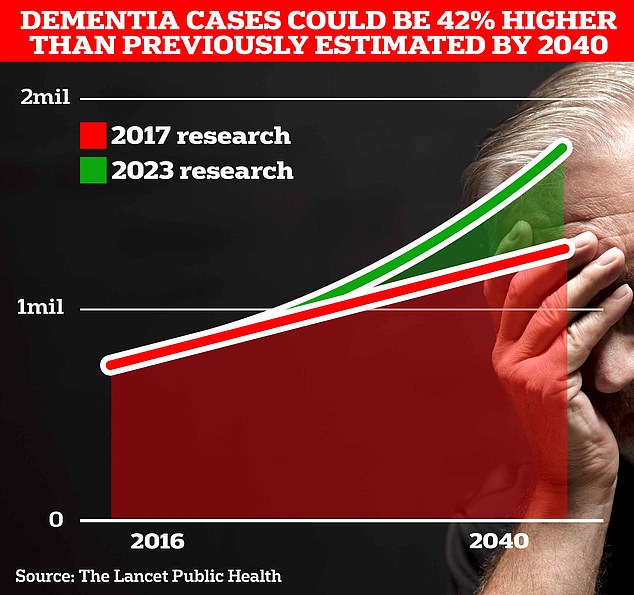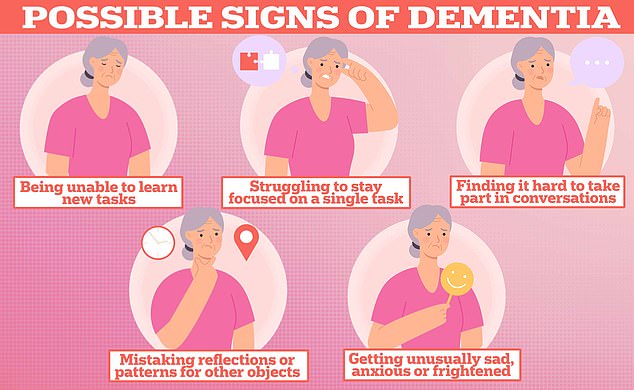New shingles vaccine could cut dementia risk by 25 per cent, Oxford research suggests…but scientists still aren’t sure why
A shingles vaccine, available on the NHS, could reduce the risk of dementia by as much as 27 per cent compared with jabs for other diseases, a study has found.
This painful and serious condition, which mainly affects older people, can cause an unpleasant rash and lead to serious problems such as deafness, long-term pain and even blindness.
In 2021, the Shingrix vaccine was introduced into the NHS, replacing the previous shingles jab called Zostavax.
And now a large study has shown that Shingrix is linked to a “significantly” lower risk of dementia compared to Zostavax and vaccines for other diseases, which have also been shown to reduce the risk of developing the condition.
Researchers from the University of Oxford analyzed data from more than 200,000 people in the US, where the Shingrix vaccine has been used for longer.
Shingrix linked to ‘significantly’ lower risk of dementia compared with Zostavax and shots for other diseases, large study found
Some of those involved had previously received the Zostavax vaccine, while others had received Shingrix.
Over six years, the team found that Shingrix was associated with a 17 percent lower risk of dementia than the previously used Zostavax, with women benefiting more than men.
Compared with people who had just been vaccinated against other infections, such as influenza and tetanus, those who received Shingrix were 23-27 percent less likely to develop dementia.
Dr Maxime Taquet, an academic clinical lecturer in the Department of Psychiatry at Oxford, who led the research, said: ‘The size and nature of this study make these findings compelling and should prompt further investigation.
‘They support the hypothesis that vaccination against shingles could prevent dementia.
‘If these findings are validated in clinical trials, they could have important implications for older adults, healthcare and public health.’
John Todd, professor of precision medicine at the Nuffield Department of Medicine at the University of Oxford, said: ‘A key question is how does the vaccine deliver the intended benefit in protecting against dementia?
‘One possibility is that infection with the herpes zoster virus (shingles) increases the risk of dementia. By inhibiting the virus, the vaccine could reduce this risk.
‘In addition, the vaccine also contains chemicals that may have a beneficial effect on brain health.’
In the UK, people are offered two doses of Shingrix when they turn 65 through the NHS, provided their 65th birthday falls on or after 1 September 2023.
People who turned 65 before this date will be eligible for the shingles vaccine when they turn 70. All people between the ages of 70 and 79 are also eligible.
People aged 50 and over with a severely weakened immune system are offered a vaccine.
Research shows that Shingrix, made by GlaxoSmithKline (GSK), can provide protection against shingles for at least ten years after the first shot.

Hundreds of participants were assessed on how healthy their lives were, scoring them between zero and six based on all the different factors. Volunteers who didn’t sweat for at least ten minutes a day for three or four days a week got nothing. The other lifestyle habits were alcohol consumption, smoking status, and sleep quality. Social interaction and having hobbies were the other two factors

It is currently thought that around 900,000 Britons suffer from the memory-robbing disorder. But scientists from University College London estimate that this number will rise to 1.7 million within two decades as people live longer. It is a 40 per cent increase on the previous forecast in 2017.

There are several possible signs of dementia, a memory-destroying condition that affects nearly 1 million Britons and seven million Americans
Professor Paul Harrison, an expert in psychiatry and OH BRC theme lead for Molecular Targets, who led the research, said: ‘The findings are intriguing and encouraging.
‘Anything that can reduce the risk of dementia is welcome, given the large and increasing number of people who suffer from it.’
Dr Sheona Scales, director of research at Alzheimer’s Research UK, welcomed the study but said more research is needed.
She said it is “not clear how the vaccine reduces the risk, nor whether the vaccine directly reduces the risk of dementia, or whether there is some other factor involved.”
“While research is still ongoing into whether vaccines affect the risk of dementia, people should be aware that there are other factors that have been definitively linked to an increased risk of dementia,” she added.
‘For example, consider smoking, high blood pressure and excessive alcohol consumption.’
Dr Taquet said the team’s interpretation of the data is that the shot slows dementia rather than preventing it entirely, although more research is needed
